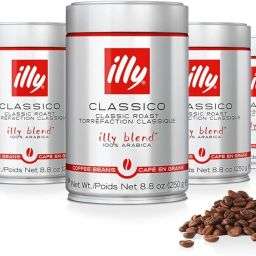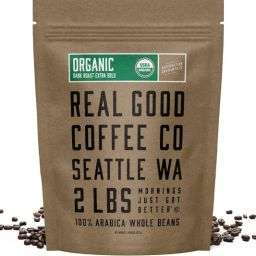
In the world of dietary preferences and sustainable living, the term “vegan coffee beans” may seem redundant at first glance. By nature, coffee beans are a purely plant-based product, derived directly from the coffee plant without the involvement of any animal products from harvest to processing.
This inherent vegan quality of coffee beans serves as the foundation for understanding how coffee fits within a vegan lifestyle, emphasizing the absence of animal exploitation in its primary production.
Key Takeaways
- Inherent Vegan Nature of Coffee Beans: Coffee beans, in their essence, are vegan, being plant-derived without any direct animal involvement.
- Environmental and Ethical Considerations: Adopting a vegan lifestyle extends beyond just avoiding animal products; it involves a consciousness about the environmental impact and ethical production methods of the foods we consume, including coffee.
- Vegan Coffee Creamers and Milks: For those seeking to enjoy their coffee without dairy, a variety of plant-based creamers and milks offer a sustainable and ethical alternative, including options such as almond, soy, and oat milk.
- Vegan-Friendly Coffee Practices: Ensuring that your coffee habit aligns with vegan ethics involves choosing products that are not only free from animal derivatives but also produced in a way that minimizes harm to the environment and animals.
What Makes Coffee Vegan?
While all coffee beans are technically vegan, the broader implications of coffee production on vegan principles warrant a deeper exploration. Sustainable coffee production practices, such as shade-grown coffee and organic farming, align more closely with vegan ethics.
These methods not only avoid the use of animal products but also consider the well-being of wildlife and the preservation of natural habitats. Certifications like the Rainforest Alliance and Bird Friendly serve as indicators of coffee that has been produced with these ethical considerations in mind, guiding consumers towards choices that reflect their values.
The distinction between simply vegan and ethically vegan-friendly coffee illuminates the importance of informed choices within a vegan lifestyle. By prioritizing coffee that upholds both the absence of animal exploitation and a commitment to environmental sustainability, individuals can ensure their consumption habits reflect a broader ethical stance.
Veganism and Coffee Consumption
Veganism extends beyond the simple avoidance of animal products to include a comprehensive ethical, environmental, and health consciousness. This broader perspective significantly influences the choices vegans make, including their coffee consumption.
Coffee, while naturally vegan as a product, enters a complex realm when considering the entirety of its production process. The ethical considerations involve not just the absence of animal products but also the environmental impact of coffee farming, such as deforestation, pesticide use, and the exploitation of labor.
Vegans must navigate these complexities by seeking coffee that aligns with their broader values. This includes supporting fair trade and organic farming practices that minimize harm to the environment and ensure fair compensation and working conditions for farmers.
Additionally, the choice of coffee impacts biodiversity and conservation efforts, making shade-grown coffee, which supports bird habitats and maintains ecosystem balance, a preferred option for many vegans.
Vegan Coffee Creamers and Milks
The transition to vegan coffee is made seamless with the variety of plant-based creamers and milks available today. Almond milk, soy milk, and oat milk are among the popular choices, each offering unique nutritional profiles and flavors. Almond milk is known for its light texture and slightly nutty flavor, making it a versatile addition to coffee.
Soy milk offers a creamier consistency and a protein-rich profile, while oat milk is celebrated for its sweetness and ability to froth, making it ideal for lattes and cappuccinos.
Choosing vegan sweeteners is another consideration for the ethically conscious coffee drinker. Traditional white sugar, processed with bone char, is avoided in favor of alternatives like coconut sugar, agave nectar, or maple syrup, which provide sweetness without compromising vegan ethics.
When selecting flavored coffees or creamers, vigilance is necessary to avoid non-vegan additives. Reading labels and opting for products explicitly marked as vegan ensures that your coffee complements a vegan lifestyle without inadvertently supporting animal exploitation or environmental harm.
Environmental Impact of Coffee Production
The burgeoning global demand for coffee has significant environmental ramifications, notably deforestation and biodiversity loss. These issues arise from the conversion of forested land into coffee plantations, which not only reduces habitat for a wide range of species but also contributes to climate change by reducing carbon sequestration capabilities of these lands.
To mitigate these impacts, vegans and environmentally conscious consumers are turning towards sustainably produced coffee. Choices include coffee certified by organizations like the Rainforest Alliance or those labeled as shade-grown, which are cultivated under a canopy of trees, preserving biodiversity and supporting bird populations.
FAQs
Is Decaf Coffee Vegan?
Decaf coffee, which undergoes a process to remove caffeine, remains vegan as long as it does not involve any animal-derived substances in its processing. The most common decaffeination processes use water, carbon dioxide, or organic solvents, none of which compromise the vegan status of the coffee.
Are Coffee Pods Vegan-Friendly?
Coffee pods, in terms of the coffee content, are generally vegan. However, the environmental concern arises from their packaging, often made of plastic and aluminum, which poses sustainability issues. For a vegan and environmentally friendly option, look for compostable or recyclable pods, and ensure any flavored varieties do not contain milk derivatives.
Can Vegans Consume Coffee Bags?
Coffee bags, similar to tea bags, typically contain only ground coffee and are vegan. Nonetheless, consumers should be aware of the environmental impact of single-use products and seek brands that offer biodegradable or compostable bags to align with a vegan lifestyle’s ethical standards.
Final Thoughts
The journey through understanding vegan coffee beans, their ethical and environmental considerations, highlights the complexity of ensuring one’s coffee consumption aligns with vegan values. Beyond just being animal-free, vegan coffee consumption encourages a broader awareness of the environmental impact and ethical production methods.
Vegans are encouraged to delve deeper into the origins and production processes of their coffee, choosing options that minimize harm to animals and the planet.









